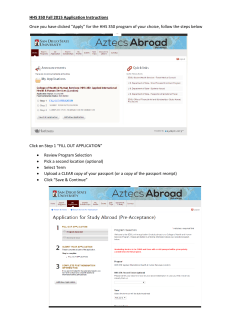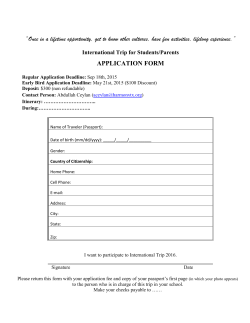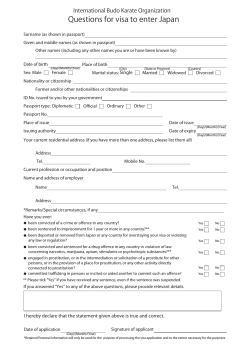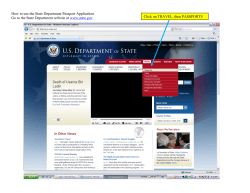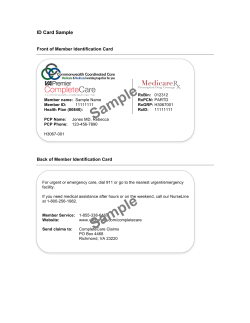
Section 4: Office Standards
Provider Manual Section 4.0 Office Standards Table of Contents 4.1 Appointment Scheduling Standards 4.2 After-Hours Telephone Coverage 4.3 Member to Practitioner Ratio Maximum 4.4 Provider Office Standards 4.5 Medical-Record-Keeping & Continuity & Coordination of Care Standards 4.6 Hospital Care 4.7 Kentucky Health Information Exchange – KHIE 4.8 Communication Guidelines Page 1 of 8 4.0 Office Standards PCPs are required to provide coverage for Passport Health Plan members 24 hours a day, seven days a week. When a PCP is unavailable to provide services, the PCP must ensure that he or she has coverage from another participating provider. Hospital emergency rooms or urgent care centers are not substitutes for coverage from another participating provider. Participating providers can consult their Passport Health Plan Provider Directory, or contact Provider Services at (800) 578-0775 with questions regarding which providers participate in the Passport Health Plan network. 4.1 Appointment Scheduling Standards Providers must adhere to the following appointment scheduling standards to assure timely access to medical care as required by the Department for Medicaid Services (DMS). Compliance with these standards will be audited by periodic on-site review of provider offices and chart sampling. Appointments with primary care providers (PCP) and specialists must be scheduled within 30 days for routine care and preventive care visits. • Appointment standards for other situations that might confront a PCP or specialist are as follows: Appointments for urgent care services must be scheduled within 48 hours. Non-urgent appointments requiring more immediate attention must be scheduled within 7 days. Appointments for emergency care must be immediately provided. Pregnant women in their first trimester are to be provided preventive care visits within 14 days of request. Pregnant women in their second trimester are to be provided preventive care visits within seven days of request. Pregnant women in their third trimester are to be provided preventive care visits within three days of request. Appointments for laboratory and radiology services must be scheduled within 30 days for routine care and 48 hours for urgent care. • 4.2 After-Hours Telephone Coverage A PCP’s office telephone must be answered in a way that the member can reach the PCP or another medical practitioner whom the practitioner has designated. Their telephone must be: • Answered by an answering service that can contact the PCP or another designated medical practitioner who can return the call within a maximum of 30 minutes; OR Page 2 of 8 • Answered by a recording directing the member to call another number to reach the PCP or another medical practitioner whom the practitioner has designated to return the call within a maximum of 30 minutes; OR • Transferred after office hours to another location where someone will answer the telephone and be able to contact the PCP or another designated medical practitioner who will return the call within a maximum of 30 minutes. Unacceptable after-hours telephone coverage in a PCP’s office includes: • • • • No answer after office hours. Telephone answered after hours by a recording that tells members to leave a message. Telephone answered after hours by a recording that directs members to go to the emergency room for any services needed. Not returning calls within 30 minutes 4.3 Member to Practitioner Ratio Maximum Per DMS regulation 907 KAR 1:705, member to PCP ratios are not to exceed 1500 to 1. If any PCP is concerned about his or her panel size or prefers a ratio smaller than 1500 to 1, he or she should notify Provider Network Management in writing at the following address: Passport Health Plan 5100 Commerce Crossings Drive Louisville, KY 40229 Attention: Provider Network Management Passport Health Plan will set the maximum panel size at 1500 members per practitioner. However, the ratio may be adjusted for practices that employ physician extenders, such as physician assistants. Passport Health Plan will consider exceptions to the 1500 to 1 ratio upon PCP request. Exceptions will be allowed based on an analysis of the practice capacity and geographic availability of other PCP practices contracted with Passport Health Plan. For additional information regarding requests for panel closings and limitations, please see Section 2.8. 4.4 Provider Office Standards • • • • • Providers must not differentiate or discriminate in the treatment of any member because of the member’s race, color, national origin, ancestry, religion, health status, sex, marital status, age, political beliefs, or source of payment. The office waiting times should not exceed 45 minutes. Members should be scheduled at the rate of six or less per hour. Health assessments/general physicals should be scheduled within 30 days. Early and Periodic Screening, Diagnosis, and Treatment (EPSDT) screens for any new enrollee younger than 21 years of age should be scheduled within 30 days of enrollment, Page 3 of 8 • unless the child is already under the care of a PCP and the child is current with screens and immunizations. EPSDT screens for any new enrollee younger than two years of age should be scheduled within an appropriate time frame so that the child is not out of compliance with any required screenings. • PCPs should have a “no show” follow-up policy. For example, the PCP or specialist might • • • • send two notices of missed appointments to the member, followed up by a telephone call to the member. Any actions for missed appointments should be documented in the member’s medical record. Provider Network Management must be notified of all PCP planned and unplanned absences of more than four days from the practice. Member medical records must be maintained in an area that is not accessible to persons not employed by the practice. When releasing a member’s medical record to another practice or provider, providers are required to first obtain written consent from the member. Any provider’s office administering care that may have an adverse effect must obtain the member’s signature on a form that describes the treatment and includes the medical indication and the possible adverse effects. Providers must complete specific treatment consent forms, such as hospice, sterilization, hysterectomy, or abortion as referenced in Section 3.4.3, “Treatment Consent Forms,” as required by state and federal regulations and laws. 4.5 Medical-Record-Keeping and Continuity and Coordination of Care Standards Passport Health Plan has adopted the following medical-record-keeping standards, which cover confidentiality, organization, documentation, access, and availability of records. These standards are determined by the National Committee for Quality Assurance (NCQA) and the Department for Medicaid Services (DMS) and may be revised as needed to conform to new NCQA or DMS recommendations. Compliance with these standards will be audited by periodic on-site review of practitioners' offices and chart samplings. Practitioners must achieve an average score of 80% or higher on the medical records review. Passport Health Plan will monitor practitioners’ scoring less than 80% through corrective action plans and re-evaluation. Confidentiality of Records Medical records are maintained in an area that is only accessible to practitioner office staff. Providers are also required to: Have policies addressing privacy and confidentiality of member information. Ensure that medical records are NOT accessible to those not employed by the practice. Post notice of privacy practices (NPP) in a prominent area of the office. Ensure that HIPAA policies and procedures are easily accessible for all staff members. Provide disclosures of PHI, patient’s right to request restriction of the use of PHI, and include a contact person within the practice. Page 4 of 8 Locate copier and fax machines in an area that restricts unauthorized access or viewing. Password protect all computer screen savers. Protect all staff members’ computer access by requiring unique log-ins and time-limited passwords. Ensure that office staff shall send all emails containing PHI marked secured or encrypted. Organization of Records • • • • • There is only one medical record per patient. The medical record is bound or pages fastened to prevent loss of medical information. Each and every page in the record contains the member’s name or ID number. The medical record is organized in chronological order with the most recent information appearing first. The record includes separate sections for progress notes, lab results, x-ray and other imaging studies, hospital records (ER report and discharge summaries), home health nursing reports, physical therapy reports, etc. All charts contain flow sheets for health maintenance. Documentation • • • • • • • • • • • • • • The record is legible. Personal data includes date of birth, age, height, gender, home and work addresses, employer, home and work telephone numbers, marital status, emergency contact information, school name and telephone numbers (if no phone contact name and number), race, ethnicity, guardianship/custodial arrangements, and identifies preferred language. Entries are done in smudge-proof non-erasable ink. Medication allergies, adverse reactions, and no known allergies are prominently noted in the record. There is a completed immunization record in all pediatric records and/or appropriate history in all adult records. All charts contain a problem list, a medication list, and a treatment plan. Significant illnesses and medical conditions are indicated on the problem list, including working diagnoses. Medical history (for members seen three or more times) is easily identified and includes medical, surgical, obstetric histories, and serious accidents. For children and adolescents (18 years of age and younger), medical history includes prenatal care, birth, operations, and childhood illnesses. Documentation includes weight recorded at each regular visit. All entries in the medical record are signed or initialed and dated and all providers are identified by name. Encounter forms or notes have a notation, when indicated, regarding follow-up care, calls, or visits. The specific time of return is noted in weeks, months, or PRN. Documentation will reflect assessment of and counseling for tobacco, alcohol, substance abuse, and risk of sexually transmitted diseases. If a consultation is requested, there is a note from the consultant in the record. Consultation, lab, and x-ray reports filed in the chart are initialed by the practitioner to indicate review. Consultation and abnormal lab and imaging study results have a specific notation in the record of follow-up plans. Emergency care provided is documented in the medical record, as well as follow-up visits Page 5 of 8 • • • • • • provided secondary to reports of emergency room care. Evidence of reportable diseases and conditions are documented and reported appropriately to local or state health departments. There is evidence that preventive screenings and services are offered in accordance with Passport Health Plan’s Clinical Practice Guidelines. Use of risk assessments, disease maintenance, and preventive health sheets are encouraged (see Section 17, “Forms and Documents” for samples). Copies of consent forms, when applicable, are maintained in the record. The medical record also contains an indication of whether an adult (over 18 years old) member has executed an advance directive and a copy of the member’s advance directive, as applicable. Written denials for service and the reason for the denial are documented in the medical record. Hospital discharge summaries are included in the medical record. Access and Availability of Records • • • • Hospital/Provider shall maintain a complete and accurate permanent medical record for each member to whom Hospital/Provider renders services. Hospital/Provider permits Passport Health Plan, on request via letter, fax or phone, access to member medical records at no cost, to inspect, review, and copy within 10 business days of receipt of request. Members have the right to all information contained in the medical record as required by law. Medical records must be made available to a member upon request at no cost to Passport or the member for first copy. When a member changes PCPs, the medical records or copies of medical records shall be forwarded to the new PCP within ten (10) business days from receipt of request at no cost to Passport or member. When releasing records to an entity other than Passport, providers are first required to obtain written consent from the member. Continuity and Coordination of Care While there are some indicators of continuity and coordination of care included within the documentation standards, Passport will also assess medical records for evidence of continuity and coordination of care using the following criteria: • • • • • The record is legible to someone other than the writer. Any record determined illegible by one reviewer shall be evaluated by a second reviewer. At each office visit, the history and the physical performed are documented and reflect appropriate subjective and objective information for presenting complaints, including any relevant psychological and social conditions affecting the patient’s medical/behavioral health. The working diagnosis is consistent with the clinical findings. The plan of action and treatment is consistent with the diagnosis and includes medication history, medications prescribed; including the strength, amount, and directions for use, as well as any therapies or other prescribed regimen. Lab and other studies are ordered as appropriate. Page 6 of 8 • • • • • Unresolved problems, referrals, and results from diagnostic tests, including results and/or status of preventive screening services (EPSDT) from previous office visits are addressed in subsequent visits. There is a review for the under-and over-utilization of consultations. Age or disease-appropriate direct access services or referrals must be documented in the medical record, for example: immunizations, diabetic retinal eye exams, family planning, and cancer screening services. There is no evidence that the patient is placed at inappropriate risk by a diagnostic or therapeutic problem. Follow-up plans including consultations, referrals, directions, and time to return. 4.6 Hospital Care Practitioners must have admitting privileges to a Passport Health Plan network hospital or facility for all patient groups for whom they are providing care. With prior written approval from Passport Health Plan’s Utilization Management department, a practitioner may arrange for another participating practitioner to provide inpatient coverage. 4.7 Kentucky Health Information Exchange – KHIE Passport Health Plan is dedicated to improving the health and quality of life of our members and actively supports the statewide implementation of the Kentucky Health Information Exchange (KHIE). The KHIE is the secure electronic information infrastructure created by the Commonwealth for sharing health information among health care organizations and offers health care providers the functionality to support meaningful use and a high level of patient-centered care. Passport Health Plan encourages participating PCP’s to connect to the KHIE through various communication channels such as annual workshops, routine onsite visits, and general provider relations interaction. KHIE is a secure, interoperable network which participating providers with certified electronic health record (EHR) technology can use to locate and share needed patient information with each other which results in improved coordination of care among physician practices, hospitals, labs, and across the various health systems. Some of the benefits include: • • • • • Real time access to patient health information including: Detailed patient summary Rx/medication history Laboratory results Radiology and other transcribed reports Clinical reminders/alerts Improved patient care quality and safety Reduced health care costs by reducing duplication of care Improved efforts to reduce health disparities Informed medical decisions at the time/place of care. Page 7 of 8 We encourage you to visit http://khie.ky.gov/cwkhie/Pages/home.aspx to obtain more information on this program and guidance on how you can make the KHIE connection. 4.8 Communication Guidelines They Kentucky Department for Medicaid Services has developed guidance related to member materials and other communication for providers participating in Medicaid managed care organizations in the state. The guidance includes the following: Providers are considered agents of all managed care organizations (MCOs). MCO’s must have a system of control over the content, form, and method of marketing and information materials published on its behalf or through its agents. Any listing of MCO’s in a provider office must include all Medicaid plans with which the provider does business. 4.8.1 Approval Process: All communication materials referring to Passport Health Plan must be approved in writing by Passport and by the Kentucky Department for Medicaid Services (DMS). Passport is responsible for submitting provider communication & information materials to the Kentucky Department for Medicaid Services (DMS) for approval. DMS has the same approval authority over provider materials as it has over MCO materials. Passport must correct any problems or errors on provider materials identified by DMS. 4.8.2 Distribution of Materials: Passport may not distribute marketing materials through its provider network. Branded health education materials may be distributed to providers by MCOs including Passport, but distribution must be limited to members of that specific plan. Branded materials cannot be left in common areas, such as waiting rooms and lobbies. Branded health education materials can not include enrollment or disenrollment information. Page 8 of 8
© Copyright 2025
